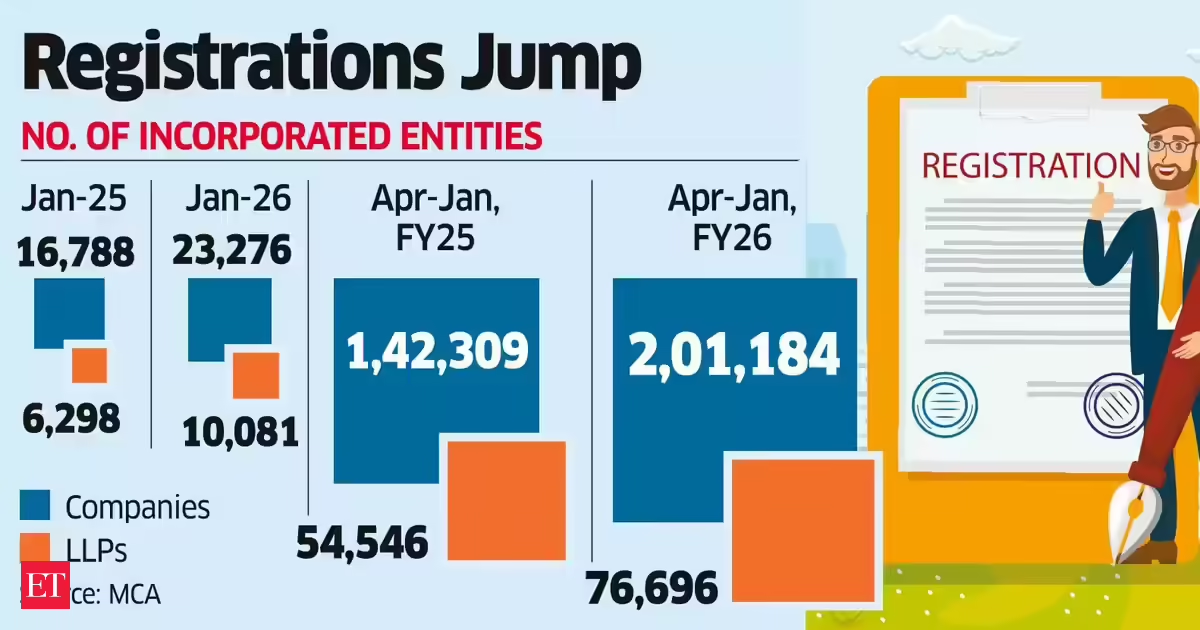Video
Finance Minister Nirmala Sitharaman’s Budget Speech LIVE | Union Budget 2026 LIVE | Budget LIVE

Finance Minister Nirmala Sitharaman’s Budget Speech LIVE | Union Budget 2026 LIVE | Budget LIVE
#Budget2026 #UnionBudget2026 #BudgetLive #NirmalaSitharaman #TaxReforms #ModiBudget #FinanceMinister #Budget2026Live #IndiaBudget #UnionBudgetLive #IndianEconomy #NirmalaSitharamanlive #IncomeTax #TaxSlabs #MiddleClass #GDPGrowth #UnionBudgetLive #BudgetDay #IndianEconomy #IncomeTax #StockMarketLive
Union Budget 2026 LIVE: Finance Minister Nirmala Sitharaman’s Budget Speech | Budget 2026 | Sansad
Finance Minister Nirmala Sitharaman presents Union Budget 2026-27 in Lok Sabha in the presence of Prime Minister Narendra Modi. She outlines the key financial policies for the upcoming financial years and allocates budget for different sections including Railways and infrastructure.
Moneycontrol is India’s leading financial portal, offering market news, expert analysis, and powerful tools.
A part of Network18, moneycontrol.com is India’s most trusted destination for financial and business news.
#live #livenews #latestnews #topnews #moneycontrol #moneycontrollive #businessnews #businessnewslive #stockmarket #stockmarket #sharemarketnews #stockmarketliveupdates
Subscribe: https://bit.ly/moneycontrolyoutube
Follow us:
Visit https://www.moneycontrol.com/
Facebook: /moneycontrol
Twitter: /moneycontrolcom
Instagram: /moneycontrolcom
source
Video
‘Big Short’ investor Michael Burry warns of death spiral ahead for bitcoin

CNBC’s MacKenzie Sigalos reports on the latest in the bitcoin sell-off.
source
Video
2B. NAMNA YA KUPATA UHURU WA KIFEDHA [ FINANCIAL FREEDOM ] KIBIBLIA // MWL CHRISTOPHER MWAKASEGE:
![2B. NAMNA YA KUPATA UHURU WA KIFEDHA [ FINANCIAL FREEDOM ] KIBIBLIA // MWL CHRISTOPHER MWAKASEGE:](https://wordupnews.com/wp-content/uploads/2026/02/1770875187_maxresdefault.jpg)
Semina Ya Neno La Mungu Iliyofanyika Dar es salaam Tarehe 23 Agosti 2008
source
Video
Ghar mai Paise KAHA Rakhe? Agar Aapko Financial Security chahiye to Ye Secret Zarur Jaane

Vastu Without Demolition: How to Change Home Energy & Attract Abundance. In this powerful and eye-opening podcast, we dive deep into the real science of Vastu Shastra – beyond fear, superstition, and unnecessary demolition. If you’ve ever been told that your home or office needs breaking walls, shifting kitchens, or major reconstruction to fix Vastu defects, this conversation will completely change your perspective.
Our guest, Architect Mala Dwivedi, founder of IPVaastu, brings over 21 years of hands-on expertise in architectural Vastu planning and practical remedies. With a B.Arch. degree and a deep inclination toward Vastu that began during her college days, Mala has successfully guided thousands of families, professionals, and businesses in transforming their lives – without tod-phod. Connect – 9922411187 & info@ipvaastu.com
You’ll learn:
– How to change the vibration of your home or office without demolition
– The most common Vastu myths and why they need to be unlearned
– How energy flow, directions, and intent influence your space
– Why some Vastu remedies work instantly while others fail
– How Vastu can be used as a tool for growth, peace, and prosperity
– The connection between space energy, mindset, and manifestation
– Practical, logical Vastu corrections that align with modern living
This podcast is especially useful for homeowners, renters, entrepreneurs, architects, interior designers, and anyone interested in abundance and conscious living. Whether you live in a flat, independent house, office, or commercial space, this discussion will help you understand how to align your environment with high-frequency energy.
#VastuShastra #VastuEnergy #AbundanceMindset #HomeEnergy #ModernVastu #VastuWithoutDemolition #EnergyAlignment #WealthAttraction #PositiveVibesOnly #SpaceEnergy #AbundanceLife #ManifestationIndia #SpiritualScience #VastuMyths #HighVibrationHome
source
Video
Mogged #car #shorts #tiktok #instagram #youtube #youtubeshorts #music #trending #new #money #sports
Video
XRP SELLING BAD NEWS!!!!! (XRP BILLIONS Just DIED)

💲👇💲
💰WIN 3,000 XRP this month on BTCC, up to $10,000 Bonus!!
👉https://bit.ly/btcc-ramos
💰My Inner Circle on DISCORD, know my trades and TOP community!!
👉https://bit.ly/patreon-ramos
💰Newcomer Bonus of $10,000 on Bitunix!!
👉https://bit.ly/bitunix-ramos
💰YouTube Membership for Livestream Perks!!
👉https://bit.ly/youtube-ramos-member
Socials:
💎Ramos Official Site and Free TRADE Group!!
👉https://bit.ly/ramos-official
💎Tiktok
👉https://bit.ly/tiktok-ramos
💎X
👉https://bit.ly/x-ramos
💎Instagram
👉https://bit.ly/insta-ramos
💎Facebook
👉https://bit.ly/face-ramos
💎Email (BUSINESS ONLY)
👉ramos.team589@gmail.com
💎Telegram (BUSINESS ONLY)
👉https://bit.ly/tele-ramos
XRP SELLING BAD NEWS!!!!! (XRP BILLIONS Just DIED)
#xrp #crypto #bitcoin
✅$1 CRO Party Telegram: https://t.me/ramoscro
✅TRADING Academy: https://epiqtradingfloor.com/?aff=5d65fe20
⛔️Disclaimer⛔️
This video is for educational purposes only. Please do your own research before making any decisions with your money. I will not be held liable for any losses or gains you may experience. I am not your financial or investment advisor. This is completely educational content and should be taken as such – the views expressed in the content are opinions. Nothing on this channel should be taken as a recommendation to buy a particular crypto asset. The information shared on this channel is not indicative of future results. Analyses are not absolute and are prone to change in accordance with present and future market events. Please do all of your own research before you buy any cryptocurrency or any financial product.
Some of the links and other products that appear on this video are from companies which Oscar Ramos will earn an affiliate commission or referral bonus. Oscar is part of an affiliate network and receives compensation for sending traffic to partner sites. The video is accurate as of the posting date but may not be accurate in the future.
I WILL NEVER CONTACT YOU IN ANYWAY (ON ANY PLATFORM). IF YOU GET CONTACTED BY ANYONE CLAIMING TO BE ME, IT IS NOT ME. FOR EXAMPLE, COMMENTS SHOWING WHATSAPP NUMBERS ARE NOT ME. ADDITIONALLY, PEOPLE HAVE THE ABILITY TO CALL YOU USING AI TECHNOLOGY SO IT SOUNDS LIKE ME. THIS AGAIN IS NOT ME. NEVER WILL I CONTACT YOU IN ANY WAY. DO NOT RESPOND OR INTERACT WITH ANYONE ON ANY PLATFORM CLAIMING TO BE ME OR WORKING ON MY BEHALF – THEY ARE SCAMMERS.
ripple xrp news,xrp news today crypto news,xrp ripple, ripple xrp,xrp news,xrp,xrp news today now,xrp community, ripple, ripple news, ripple lawsuit,xrp lawsuit update, bitcoin price prediction,xrp price prediction, ripple xrp news today, Ripple, Ripple vs SEC,xrp case, ripple case,xrp price
source
Video
LIVE: Finance Minister Nirmala Sitharaman’s Budget Speech | #Modinomics | Markets & Economy

#Modinomics2026 #UnionBudget2026 #Budget2026 #UnionBudget #Budget26 #FMNirmalaSitharaman #PMMmodi #BudgetwaytheBTway #BusinessToday #BusinessTodayTV #BudgetLive #Finance #Economy #StockMarket #IndiaGrowth #EconomicAnalysis #BudgetSession #IndianEconomy #IndiaGrowth
@Zoho @nseindia @ministryoffinancegovernmen8364 @n.sitharaman
———————–
Thank You for watching! Do not forget to Like | Comment | Share
———————–
About the channel
Watch us for the best news and views on business, stock markets, crypto currencies, consumer technology, the world of real estate, bullion, automobiles, start-ups and unicorns and personal finance. Business Today TV will also bring you all you need to know about mutual funds, insurance, loans and pension plans among others.
Follow us at:
Website: https://www.businesstoday.in
WhatsApp: whatsapp.com/channel/0029Va4Hd309hXFCqY62yD2I
Facebook: https://www.facebook.com/BusinessToday
twitter: https://twitter.com/business_today
Instagram: https://www.instagram.com/business_today/
source
Video
XRP He Called the Bottom.

Uphold – Best Place To Buy XRP:https://uphold.sjv.io/b3v0Kv
First ledger: https://firstledger.net/?ref=viacD0HE9uvj
Caleb and brown- https://calebandbrown.com/affiliates/xrpmickle/
X: https://x.com/xrpmickle
Merch!
micklemarkets.myspreadshop.com…
Donate me some XRP 🙂
rDxBFHhgGKYKphFEtoyNvEmujC3ATGRqmN
Become a supporter of Mr. Mickle!
https://www.youtube.com/channel/UC-wi…
#ripple #XRP #Bitcoin #xrpnew #crypto #cryptocurrency
Best crypto to buy now. Best altcoin. Top crypto now. What is Ripple? What Is XRP? How much XRP do you need? How much XRP? XRP Coin. BTC Coin. What just happened to XRP and Ripple. Ripple IPO. When Will Ripple IPO. RLUSD. What is RLUSD
The information contained on YouTube or the Mickle Markets YouTube Channel (“Channel”) is provided for general informational purposes only. The information provided is not intended to be a substitute for professional investment, tax, accounting, or legal advice. Mickle Markets (the “Company”) is not engaging in services as a securities brokerage, investment advisor, tax, accounting, or legal services provider to the viewers of this website, nor is the Company extending any solicitation or offer to the viewers to sell or buy any cryptocurrencies or securities. The viewers should engage their own professional qualified financial, legal, or tax advisor. The Company is not liable to the viewer for any possible claims or damages arising from any decision they make based on the content of YouTube or this Channel. The viewers’ use of YouTube or this Channel and any reliance on the information contained therein is at the viewers’ own risk. The Company makes no representation or warranties about the accuracy or completeness of the information contained on this Channel or YouTube. Any testimonials or descriptions of past trading experiences published on this Channel or YouTube are not typical, not indicative of future results or performances, and are not intended to be a representation, warranty or guarantee that similar results will be obtained. Any links or references to external sources are provided solely for convenience and do not necessarily imply that the Company endorses, sponsors, promotes, or is affiliated with the external sources.
source
Video
When you receive your SALARY, DO THIS and GET RICH in 3 MONTHS – Robert Kiyosaki.

When you receive your SALARY, DO THIS and GET RICH in 3 MONTHS – Robert Kiyosaki.
#howtobecomebillionaire #financialeducation #robertkiyosaki
Imagine having the chance to break free from that vicious cycle where you’re constantly short on cash, and start earning money the way millionaires do. What if I told you that all you need isn’t more knowledge or harder work, but the right mindset and a few simple yet powerful principles that will transform your financial future?
At first, it might seem impossible, but Robert Kiyosaki, the author of the legendary book “Rich Dad Poor Dad”, has unveiled secrets that have already helped millions of people around the world become financially independent. In this video, I’ll explain how to think like a wealthy person, why the traditional job model can keep you trapped in poverty, and what steps you should take to finally level up.
Want to learn how to control your finances instead of being controlled by them? Then stay tuned till the end — you definitely won’t regret it!
#wealth #financialeducation #howtobecomebillionaire #robertkiyosaki #money #rich #richdadpoordadi
source
Video
Bitcoin explained and made simple

Baffled by bitcoin? Confused by the concept of crypto-currencies? Well, fear no more. In 190 seconds we explain what bitcoin actually is, where the idea came from and the impact it’s having around the world. Is bitcoin the future of finance, a potential destroyer of the economy … or just a silly slice of technical utopianism?
Subscribe to The Guardian on YouTube ► http://is.gd/subscribeguardian
Support the Guardian ► https://support.theguardian.com/contribute
Today in Focus podcast ► https://www.theguardian.com/news/series/todayinfocus
Sign up for the Guardian documentaries newsletter ► https://www.theguardian.com/info/2016/sep/02/sign-up-for-the-guardian-documentaries-update
The Guardian ► https://www.theguardian.com
The Guardian YouTube network:
Guardian News ► http://is.gd/guardianwires
Guardian Football ► http://is.gd/guardianfootball
Guardian Sport ► http://bit.ly/GDNsport
Guardian Culture ► http://is.gd/guardianculture
#bitcoin #crypto #cryptocurrency #bitcoinexplained
source
Video
Prepare: We Are Entering Phase 3 Of The Investing Cycle

Register for my investing Workshop & get Market Briefs as a bonus: https://go.briefs.co/2026investorworkshop/?utm_campaign=January2026Webinar&utm_medium=organic&utm_content=KtKI81Qw8i0&utm_term=minority_mindset&utm_source=youtube&utm_placement=youtubedecription
My recommended tools*!
*Please note: Yes, these are our sponsors & advertisers. However, these are companies that I trust and use (or have used). The compensation doesn’t affect my recommendations or advice. That being said, you should always do your own research & never blindly listen to a random guy on YouTube.
———-
➤ Life Insurance
1) 🛡 Policygenius – Get a free life insurance quote:
https://theminoritymindset.com/policygenius
———-
➤ Real Estate Investing Online
2) 🏠 Fundrise* – Invest in real estate passively!
https://www.theminoritymindset.com/fundrise
*Jaspreet Singh is an equity owner in Fundrise and has invested in Fundrise. He receives a commission if you use his affiliate link.
———-
➤ My Favorite Credit Cards
3) 🪪: See my top credit card picks for this month:
https://www.theminoritymindset.com/creditcards
———-
➤ Invest In Stocks Passively
4) 📈 M1 Finance – Buy stocks & ETFs on autopilot:
https://theminoritymindset.com/m1
———-
➤ Business Accounting
5) 💸 CommonWealth – Does your business do over $250k/year? If yes, get a free consultation from my partner accounting firm:
https://theminoritymindset.com/tax
———-
Buy Gold Passively
6) 👑 Vaulted – Buy physical gold on autopilot:
https://theminoritymindset.com/yt/vaulted
———-
Recommended:
The Fed Just Admitted It… They Can’t Fix the Housing Market
What Is The Minority Mindset?
“The Minority Mindset has nothing to do with the way you look. It’s the mindset of thinking differently than the majority of people” ~Jaspreet Singh
Follow me:
Instagram: https://www.Instagram.com/MinorityMindset
Website: https://www.TheMinorityMindset.com
Want More 🥑🥑?
Briefs Finance website: https://www.briefs.co
Minority Mindset Clips: https://www.youtube.com/minoritymindsetclips
Minority Mindset En Español: https://www.youtube.com/minoritymindsetenespanol
Video host: Jaspreet Singh
DISCLAIMER: This description may contain links from our affiliates, sponsors, and partners. If you use these products, we will get compensated – but there’s no additional cost to you.
DISCLAIMER CONT’D: I’m just a random guy on YouTube so do your own research! Jaspreet Singh is not a licensed financial advisor. He is a licensed attorney, but is he is not providing you with legal advice in these videos. This video, the topics discussed, and ideas presented are Jaspreet’s opinions and presented for entertainment purposes only. The information presented should not be construed as financial or legal advice. Always do your own due diligence.
source
-

 Politics4 days ago
Politics4 days agoWhy Israel is blocking foreign journalists from entering
-

 Sports5 days ago
Sports5 days agoJD Vance booed as Team USA enters Winter Olympics opening ceremony
-

 NewsBeat2 days ago
NewsBeat2 days agoMia Brookes misses out on Winter Olympics medal in snowboard big air
-

 Business3 days ago
Business3 days agoLLP registrations cross 10,000 mark for first time in Jan
-

 Tech5 days ago
Tech5 days agoFirst multi-coronavirus vaccine enters human testing, built on UW Medicine technology
-

 Sports5 hours ago
Sports5 hours agoBig Tech enters cricket ecosystem as ICC partners Google ahead of T20 WC | T20 World Cup 2026
-

 Business3 days ago
Business3 days agoCostco introduces fresh batch of new bakery and frozen foods: report
-

 Tech1 day ago
Tech1 day agoSpaceX’s mighty Starship rocket enters final testing for 12th flight
-

 NewsBeat3 days ago
NewsBeat3 days agoWinter Olympics 2026: Team GB’s Mia Brookes through to snowboard big air final, and curling pair beat Italy
-

 Sports3 days ago
Sports3 days agoBenjamin Karl strips clothes celebrating snowboard gold medal at Olympics
-
Sports5 days ago
Former Viking Enters Hall of Fame
-

 Politics4 days ago
Politics4 days agoThe Health Dangers Of Browning Your Food
-
Sports6 days ago
New and Huge Defender Enter Vikings’ Mock Draft Orbit
-

 Business4 days ago
Business4 days agoJulius Baer CEO calls for Swiss public register of rogue bankers to protect reputation
-

 NewsBeat6 days ago
NewsBeat6 days agoSavannah Guthrie’s mother’s blood was found on porch of home, police confirm as search enters sixth day: Live
-

 Business6 days ago
Business6 days agoQuiz enters administration for third time
-

 Crypto World7 hours ago
Crypto World7 hours agoPippin (PIPPIN) Enters Crypto’s Top 100 Club After Soaring 30% in a Day: More Room for Growth?
-

 Crypto World2 days ago
Crypto World2 days agoBlockchain.com wins UK registration nearly four years after abandoning FCA process
-

 Video2 hours ago
Video2 hours agoPrepare: We Are Entering Phase 3 Of The Investing Cycle
-

 Crypto World2 days ago
Crypto World2 days agoU.S. BTC ETFs register back-to-back inflows for first time in a month






![2B. NAMNA YA KUPATA UHURU WA KIFEDHA [ FINANCIAL FREEDOM ] KIBIBLIA // MWL CHRISTOPHER MWAKASEGE:](https://wordupnews.com/wp-content/uploads/2026/02/1770875187_maxresdefault-80x80.jpg)
